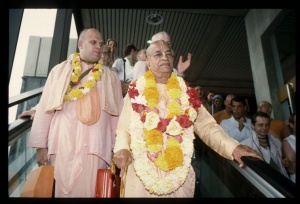CC Madhya 20.311 (1975): Difference between revisions
(Vanibot #0027: CCMirror - Mirror CC's 1996 edition to form a basis for 1975) |
(Vanibot #0020: VersionCompareLinker - added a link to the Version Compare feature) |
||
| Line 2: | Line 2: | ||
<div style="float:left">'''[[Sri Caitanya-caritamrta (1975)|Śrī Caitanya-caritāmṛta (1975)]] - [[CC Madhya (1975)|Madhya-līlā]] - [[CC Madhya 20 (1975)|Chapter 20: Lord Śrī Caitanya Mahāprabhu Instructs Sanātana Gosvāmī in the Science of the Absolute Truth]]'''</div> | <div style="float:left">'''[[Sri Caitanya-caritamrta (1975)|Śrī Caitanya-caritāmṛta (1975)]] - [[CC Madhya (1975)|Madhya-līlā]] - [[CC Madhya 20 (1975)|Chapter 20: Lord Śrī Caitanya Mahāprabhu Instructs Sanātana Gosvāmī in the Science of the Absolute Truth]]'''</div> | ||
<div style="float:right">[[File:Go-previous.png|link=CC Madhya 20.310 (1975)|Madhya-līlā 20.310]] '''[[CC Madhya 20.310 (1975)|Madhya-līlā 20.310]] - [[CC Madhya 20.312 (1975)|Madhya-līlā 20.312]]''' [[File:Go-next.png|link=CC Madhya 20.312 (1975)|Madhya-līlā 20.312]]</div> | <div style="float:right">[[File:Go-previous.png|link=CC Madhya 20.310 (1975)|Madhya-līlā 20.310]] '''[[CC Madhya 20.310 (1975)|Madhya-līlā 20.310]] - [[CC Madhya 20.312 (1975)|Madhya-līlā 20.312]]''' [[File:Go-next.png|link=CC Madhya 20.312 (1975)|Madhya-līlā 20.312]]</div> | ||
{{CompareVersions|CC|Madhya 20.311|CC 1975|CC 1996}} | |||
{{RandomImage}} | {{RandomImage}} | ||
==== TEXT 311 ==== | ==== TEXT 311 ==== | ||
<div class="verse"> | <div class="verse"> | ||
: | :'śiva'--māyā-śakti-saṅgī, tamo-guṇā veśa | ||
:māyātīta, guṇātīta | :māyātīta, guṇātīta 'viṣṇu'--parameśa | ||
</div> | </div> | ||
| Line 25: | Line 24: | ||
<div class="translation"> | <div class="translation"> | ||
"Lord Śiva is an associate of the external energy; therefore he is absorbed in the material quality of darkness. Lord Viṣṇu is transcendental to māyā and the qualities of māyā. Therefore He is the Supreme Personality of Godhead. | |||
</div> | </div> | ||
| Line 32: | Line 31: | ||
<div class="purport"> | <div class="purport"> | ||
Viṣṇu is beyond the range of the material manifestation, and He is not within the control of the material energy. He is the supreme independent Personality of Godhead. This is admitted | Viṣṇu is beyond the range of the material manifestation, and He is not within the control of the material energy. He is the supreme independent Personality of Godhead. This is even admitted by Śaṅkarācārya: nārāyaṇaḥ paro 'vyaktāt (Gīta-bhāṣya). In his constitutional form, Śiva is a mahā-bhāgavata, a supreme devotee of the Lord, but because he accepts māyā's association-especially the quality of ignorance-he is not free from māyā's influence. Such an intimate association is completely absent in the Supreme Personality of Godhead, Viṣṇu. Lord Śiva accepts māyā, but in the presence of Lord Viṣṇu, māyā does not exist. Consequently Lord Śiva has to be considered a product of māyā. When Lord Śiva is free from māyā's influence, he is in the position of a mahā-bhāgavata, a supreme devotee of Lord Viṣṇu. Vaiṣṇavānāṁ yathā śambhuḥ. | ||
</div> | </div> | ||
Latest revision as of 13:13, 27 January 2020

A.C. Bhaktivedanta Swami Prabhupada
TEXT 311
- 'śiva'--māyā-śakti-saṅgī, tamo-guṇā veśa
- māyātīta, guṇātīta 'viṣṇu'--parameśa
SYNONYMS
śiva—Lord Śiva; māyā-śakti-saṅgī—an associate of the external energy; tamaḥ-guṇa-āveśa—absorbed by the quality of ignorance; māyā-atīta—transcendental to the external energy; guṇa-atīta—transcendental to the qualities of matter; viṣṇu—Viṣṇu; parama-īśa—the Supreme Lord.
TRANSLATION
"Lord Śiva is an associate of the external energy; therefore he is absorbed in the material quality of darkness. Lord Viṣṇu is transcendental to māyā and the qualities of māyā. Therefore He is the Supreme Personality of Godhead.
PURPORT
Viṣṇu is beyond the range of the material manifestation, and He is not within the control of the material energy. He is the supreme independent Personality of Godhead. This is even admitted by Śaṅkarācārya: nārāyaṇaḥ paro 'vyaktāt (Gīta-bhāṣya). In his constitutional form, Śiva is a mahā-bhāgavata, a supreme devotee of the Lord, but because he accepts māyā's association-especially the quality of ignorance-he is not free from māyā's influence. Such an intimate association is completely absent in the Supreme Personality of Godhead, Viṣṇu. Lord Śiva accepts māyā, but in the presence of Lord Viṣṇu, māyā does not exist. Consequently Lord Śiva has to be considered a product of māyā. When Lord Śiva is free from māyā's influence, he is in the position of a mahā-bhāgavata, a supreme devotee of Lord Viṣṇu. Vaiṣṇavānāṁ yathā śambhuḥ.